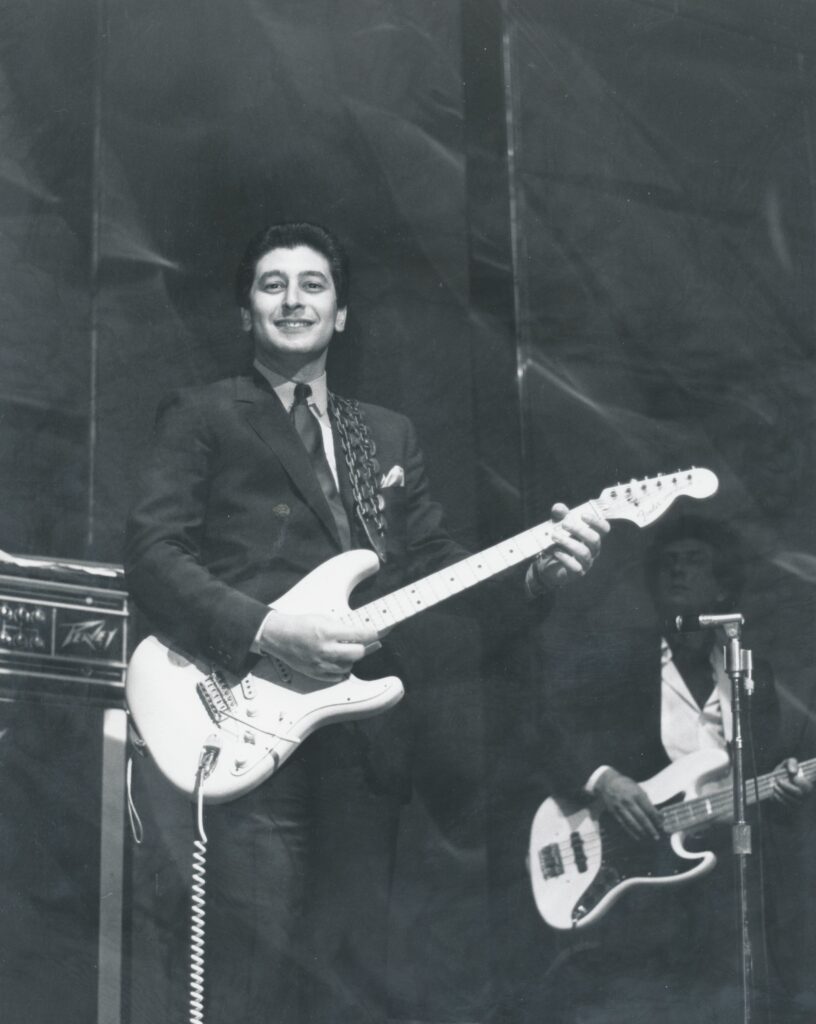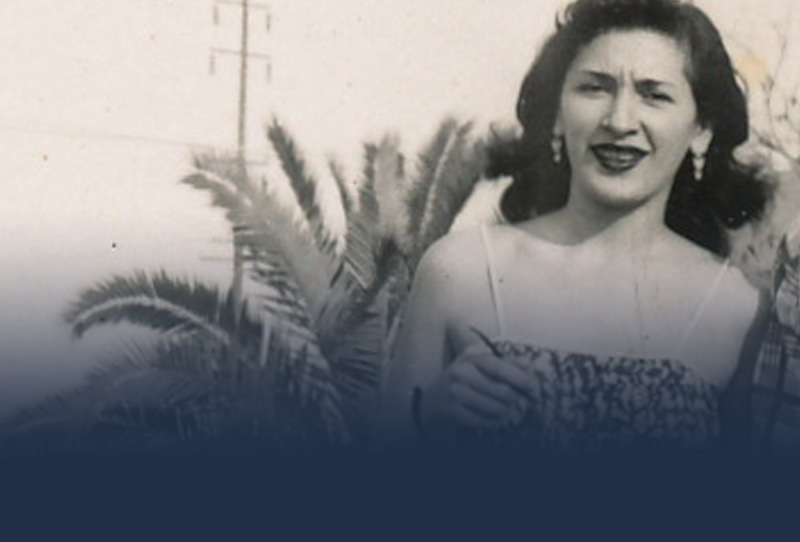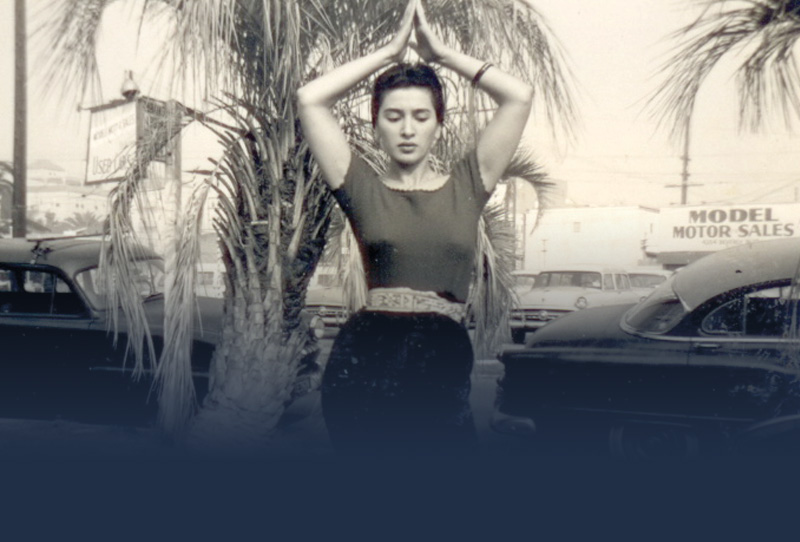Habibi: Vol. 6, No. 5 (1981)
Introductory Note: Omar Khorshid (1945-1981) was an Arabic guitarist and composer who worked with many greats of Arabic music including Abdel Halim Hafez, Baligh Hamdi, Muhammad Abdel Wahab, and Oum Kalthoum. Khorshid learned classic Arabic music but also experimented with Western themes. He is considered by many to be one of the great Arabic musicians.
He was on the threshold of life. Certainly the most tall, dark, and handsome Egyptian I had ever met. When I was first introduced to him I felt like a giggling schoolgirl, but he put me at ease with his simple friendliness. I thought of his career and popularity and agreed with millions of Middle Eastern fans that his fame was the result of natural talent and persistent hard work. What a thrill to hear in person the songs he had made popular and to witness the frenzy of a public that had made him wealthy. Rumors of a Turkish background and adoption by Oum Kalthoum were a project for future investigation.
When his group came to the United States in the fall of 1980 there was very little time for an extensive interview. I did manage a general interview on tape through which I had hoped to write a three-part series for Habibi. Composer, musician, actor, and the owner of his own studio in Egypt, he had accomplished so much for a man in his early 30s. A very genuine invitation from Omar to come to Egypt as his guest would hover in my mind, and I hoped someday to take him up on it.
Recently over the telephone Samir Khoury told me Omar had gotten married somewhere around April 1981. Lucky girl, I thought! At the beginning of June a dancer friend called and said that Omar Khorshid was dead. Her Egyptian boyfriend got a letter from home. What? How? She had no details. I called Samir Khoury and he hadn’t heard but would check around. One week later I went into his shop and he presented me with an Arabic newspaper confirming the news of his death. There was a photograph of Omar Khorshid looking handsome in a white turtleneck sweater with tousled black curly hair embracing his beautiful young bride. There was also a photograph of the car that he got into after leaving a party. He was being hassled by some people and, as he attempted to avoid them, his car swerved, hitting a wall and killing him instantly.
Interview with Omar Khorshid
J: I wanted to tell you how much I enjoyed meeting you and how much I enjoyed your concerts. I would like to know. . . are you pleased with your tour?
O: Yes, I’m very glad.
J: How many cities have you played so far?
O: Six, up ‘til now.
J: Do you have any favorite cities?
O: San Francisco is one of my favorites. It [the concert] was very successful. The audience were good listeners, and it was obvious that they appreciated.

J: I should say you have many fans here, definitely. Do you have any comments on the expectations for your group. . .what did you hope to accomplish with your tour?
O: I came here without all of my group [full group is nine including Omar]. I left three main musicians in Cairo. I would be more pleased if I had brought the whole group with me so the music would be more powerful.
J: Do you consider yourself a modern, concert, or classical musician?
O: My studies were classical. The sort of music I’m performing is completely different and new. It’s not jazz, [but] it’s not the classical oriental music. It is modern oriental music. I have created a way of playing the oriental guitar by making quarter tones on the guitar. This doesn’t exist on the instrument itself. I didn’t change anything on the instrument itself; I have developed the technique with my fingers.
J: What is your background in music?
O: I have studied at the Royal Academy of London. Before that I was studying classical music at the Greek Institute in Cairo and then after that I started playing jazz music and then pop music and then all of a sudden I changed and played with the late Oum Kalthoum. . .so I joined her band and started playing oriental music and after a year I started thinking about changing the way of playing on the guitar. . .taking advantage of all my studies and all the syncopated jazz rhythms I’m using. . .and I used it in the oriental beats to syncopate the oriental beats. Maybe you felt this yesterday because the rhythm itself when I left the organ, for instance, or the violin made his solo, I used to go around him with rhythm in a different way than the normal classical oriental beat. I used a lot of syncopation. So that’s why it was new.
J: I want to ask you. Are there any American groups that you admire? That you feel have inspired you in any way?
O: Yes, there are a lot of groups…for instance the BeeGees. My favorite guitar player is the American jazz guitarist Wes Montgomery.
J: What do you foresee in the future for Egyptian music?
O: I hope that the Egyptian music becomes harmonized and orchestrated by using counterpoints, harmony, and to find the way to harmonize even the quarter tones. If we cannot harmonize the quarter tones then we can make it a passage. I started already making my studies about that because I’m an orchestrator too, not only a performer. I’ve composed music for about fifty motion pictures and won nine prizes. I have a very nice letter with a certificate from President Carter and another one from the Secretary of the White House Gretchen Posten. I have them right here with me.
J: Well you deserve all the success, you have worked very hard. Do you think Egyptian music is greatly influenced by Western music?
O: I think the Egyptian beat is more attractive than the Egyptian music for the Western listeners. Because the beat itself—it’s a heartbeat. It’s an African beat after all and it takes the ear immediately; so whenever we start the beat, any Westerner feels it…I noticed that. But the music itself is difficult. That’s why I modernized the music, so [Western listeners] can listen or appreciate both of them: the music and the beat. That’s why I used Western instruments to give our music rhythm in a modern way.
J: I think that your popularity is definitely based on your talents. You are very young for a person that is so accomplished. I hope you have a very long life ahead of you and many more successes along the way.
This article was published in Jamila’s Article Book: Selections of Jamila Salimpour’s Articles Published in Habibi Magazine, 1974-1988, published by Suhaila International in 2013. This Article Book excerpt is an edited version of what originally appeared in Habibi Vol. 6, No. 6 (1981).
Photo Credits:
- Omar Korshid in concert; publicity photo from the Jamila Salimpour Archives.
- Wes Montgomery (1923-1968), a jazz guitarist who created his own signature sound by using wide octave ranges and the side of his thumb to pluck strings. Photographed by Bruno of Hollywood. Published by Verve Records. Public domain, via Wikimedia Commons. Accessed July 2023.


